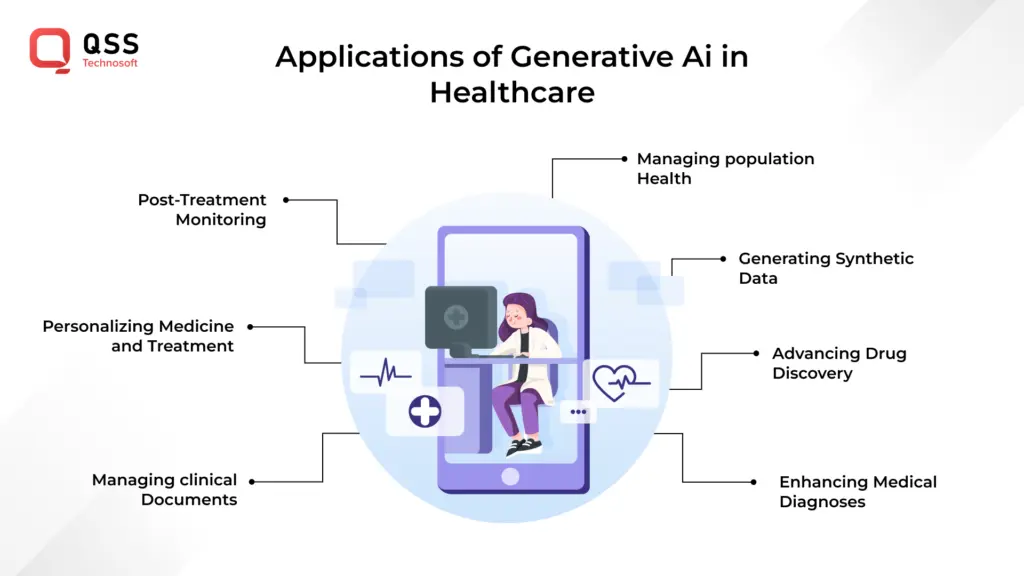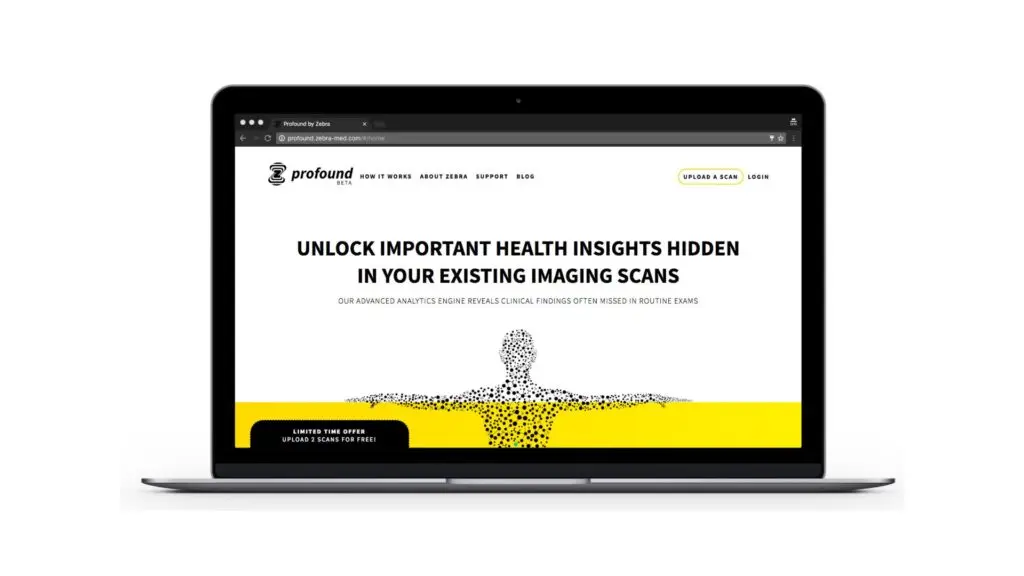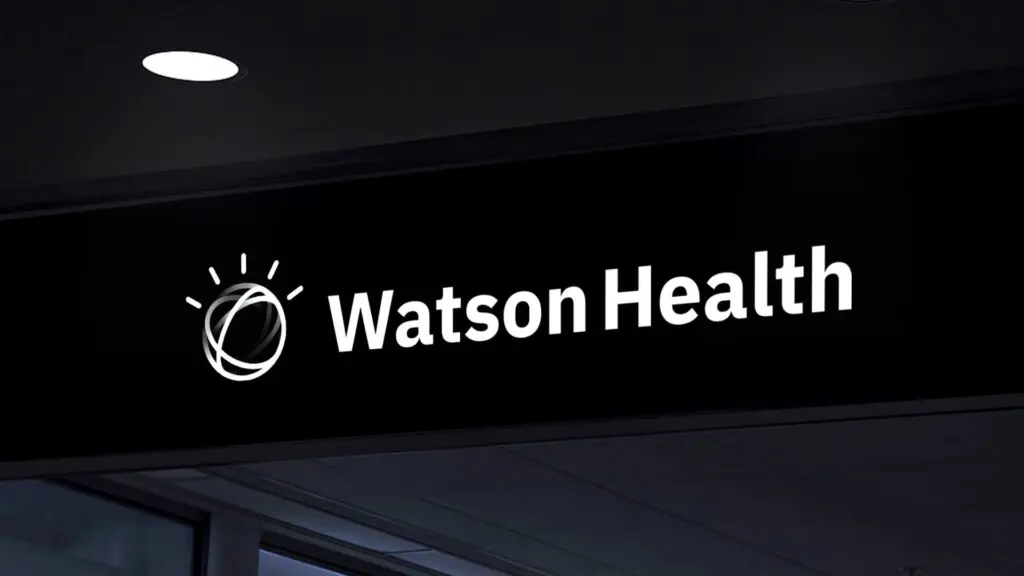Imagine having a healthcare system where we can conveniently analyze medical imaging scans with cent percent accuracy, enabling earlier detection of life-threatening diseases like cancer. This cutting-edge capability is made possible by Generative AI. This innovative technology learns from vast datasets (from previous medical data) to continually improve its accuracy over time while reducing medical errors.
Not just this, AI automates routine administrative tasks thus allowing healthcare professionals to focus more on other crucial aspects of patient care. In this article let’s dive into how Generative AI is revolutionizing healthcare, supported by real-world examples.
Statistics Supporting the Impact
Here are some latest studies about Generative AI in healthcare conducted by NCBI:
- Increased Accuracy: NCBI Studies have shown that Gen AI algorithms can diagnose the disease much faster by up to 20% compared to traditional methods.
- Reduced Time: Another study reveals that Gen AI technology can analyses medical image reducing the diagnosis time by 30-40%. This saves the time of radiologists, and they can focus on more complex cases. (Research by NCBI)
- Reduced Costs: The integration of Gen AI in medical imaging can reduce healthcare costs significantly in early detection of diseases and reduce the need for repeat scans.
- Enhanced Patient Outcomes: As per NCBI, AI-driven personalized treatment plans can improve patient outcomes by 15-20% through more targeted therapies.
- Enhances Operations: AI can automate the routine admin tasks of healthcare departments. This leads to a 25% reduction in work overload for healthcare professionals working as admins. (Study by National Health Institute)
Also Read :- Generative AI in Creative Industries: Transforming Art, Music, and Content Creation
Key Technologies Involved in Gen AI
Generative AI leverage advanced technologies like:
- Machine Learning (ML) that enables systems to learn from data and improve over time.
- Neural Networks works on computational models and recognize patterns to make predictions.
- Natural Language Processing (NLP) allows machines to understand, generate & converse in human-like language.
- Generative Adversarial Networks (GANs): This model works with two networks, a generator & a discriminator, where one creates new data & the other checks its reliability.
How is Generative AI Impacting the Healthcare Sector in 2024
Generative AI is reshaping the industry by transforming medical practice and improving patient care. Here’s is the broader impact of Generative AI in healthcare:

Drug Discovery
- Speed up the drug discovery: AI models have ability to predict the interactions between different drug molecules and biological targets, which in turn speed up the process of finding new drugs.
- Reduce Costs: Gen AI can stimulate thousands of chemical reactions together. This eliminates the need for costly and time-taking lab experiments.
- Accurate Predictions: AI can forecast the potential side effects of new drugs. This is very helpful for researchers for further drug development.
Faster Diagnosis
- Quick Data Analysis: AI can quickly analyze vast amounts of medical data like patient history, genetic info, and health symptoms and accordingly make most accurate diagnoses.
- Early Disease Detection: AI algorithms can identify early signs of life-threatening diseases such as cancer, Alzheimer’s, and cardiovascular conditions, even before the symptoms start showing up.
- Accurate MRI Scans: AI-powered imaging tools produce MRI scans with much clarity enabling radiologists to detect abnormalities which are otherwise not possible with human eye.
Personalized Medicine
- Tailored Treatments: By analyzing a patient’s genetic information, Gen AI can recommend personalized treatment plans that are more effective.
- Pharmacogenomics: AI can predict how different patients will respond to specific medications based on their genes. This helps in drug dosing and further treatment adjustments.
Virtual Health Assistants
- 24/7 Patient Support: AI-driven chatbots can provide round-the-clock support to patients. From answering medical queries to booking appointments & reminding patients to take their medication, you can leave everything on these intelligent virtual assistants.
- Patient Monitoring: AI-powered virtual health assistants can track symptoms and health vitals for patients with chronic conditions and alert healthcare providers during any emergency.
Predictive Analytics in Patient Care
- Risk Assessment: AI can analyze patient data and forecast adverse health conditions in advance so that immediate preventive action can be taken.
- Readmission Reduction: AI also assists in identifying high risk patients, enabling healthcare providers to implement targeted strategies reducing hospital readmissions.
Operational Efficiency
- Supply Chain Management: AI can keep track of hospital inventory levels, reducing wastage and maintaining proper demand & supply.
- Resource Allocation: AI also helps hospitals allocate staff and medical equipment by predicting patients’ inflow and resource shortage.
- Administrative Automation: AI-driven can automate administrative tasks, such as billing and scheduling appointments, thereby eliminating manual processes and chances of human error.
Telemedicine and Remote Care
- Teleconsultations: AI helps in telemedicine consultations over phone and offers full healthcare support remotely.
- Remote Monitoring: AI-powered health apps and wearables can monitor patients remotely & alert healthcare providers to any abnormalities
- Remote Access to Care: AI-driven telemedicine platforms can offer medical services to remote rural areas.
AI in Medical Research
- Clinical Trials: AI can help in clinical trials too by identifying suitable candidates for trials, and monitoring trial data in real time.
- Research Data Analysis: AI can process vast amounts of research data. This helps in disease mechanisms and potential therapeutic targets.
- Bioinformatics: AI tools can analyze complex biological data like genetics thereby advancing biomedical research.
Real World Examples of Popular Companies Using Generative AI for Healthcare
Here are some real-world examples of popular healthcare firms in the world that have been leveraging Gen AI to transform patient care to all new levels.
Zebra Medical Vision
Zebra Medical Vision is an AI-driven healthcare company that has been using Generative AI to analyze medical images with 98% accuracy. The company is leveraging AI models to detect health conditions like early-stage cancers, liver abnormalities & other cardiovascular diseases.

PathAI
PathAI is a Biotechnology company in Boston that has been using AI in pathology diagnostics. Generative AI technology assists pathologists in identifying cancerous tissues with higher accuracy which is otherwise missed by the human eye. The company is using AI algorithms to analyze pathology slides at faster speed. This leads to faster diagnostic processes & better patient outcomes.
Aidoc
Aidoc is an early adopter of AI and has been revolutionizing the radiology field with AI. AI’s deep learning algorithms help in detecting abnormalities in medical images, such as brain hemorrhages or pulmonary embolisms. Not just this, AI is also helping radiologists manage their workload more effectively by streamlining operations.
IBM Watson Health
IBM Watson Health utilizes AI to assist in personalized cancer treatment. By analyzing vast datasets of medical literature and patient records, Watson can recommend tailored treatment plans for cancer patients. This approach has been particularly effective in identifying suitable clinical trials and novel therapies for complex cancer cases.

Tempus Inc.
Tempus uses AI to gather and analyze clinical and molecular data for offering personalized cancer treatment. Their platform integrates AI-driven data analytics to match patients with the most effective therapies based on their unique genetic profiles, improving treatment outcomes and reducing trial-and-error in cancer care.
Also Read:- Crafting Smart Apps with Generative AI- The Future of App Development Industry
Final Thoughts
There is no doubt that the healthcare sector is greatly experiencing a boost with the integration of Generative AI technology. Not only does it enhance diagnostic accuracy but also streamlines healthcare operations improving medical care & overall patient outcomes.
Healthcare facilities, clinics and other medical departments & researchers can adopt this innovative technology to stay at the top of medical innovation. By investing in hiring expert generative AI team, they can harness the full potential of AI for their healthcare solutions.
Hire services from a top-tier Generative AI development company to stay ahead of your competitors!
If you’re interested in exploring AI solutions for your business, contact us today for a FREE consultation.


Which Industry is Getting the Biggest Boost with Generative AI in 2024?